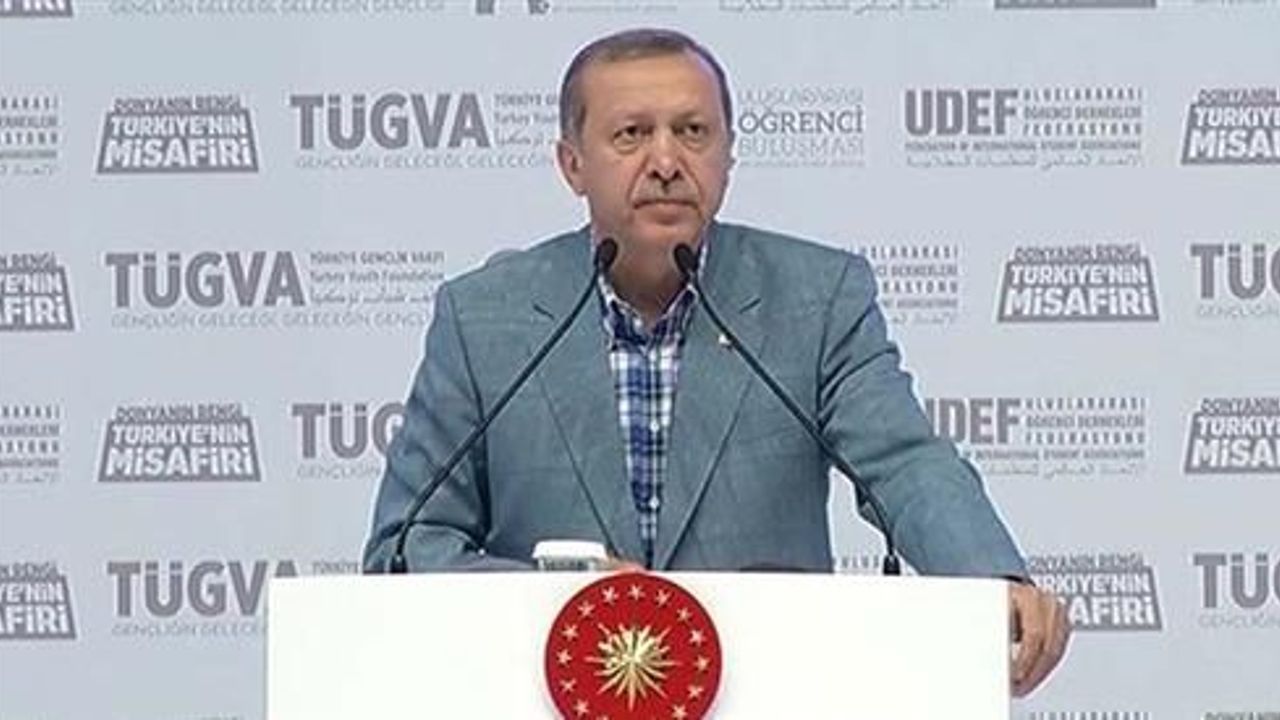Erdogan asks why 'West remains silent' on Morsi verdict
Politics |
Turkish President Recep Tayyip Erdogan has termed an Egyptian courts death penalty on ousted President Morsi as a capital punishment against democracy.

Font Size:
Turkish President Recep Tayyip Erdogan has termed an Egyptian courts death penalty on ousted elected President Mohamed Morsi as a capital punishment against democracy.
Speaking in Istanbul at an international youth event Saturday, Erdogan criticized the death penalty against Morsi. "If Morsi is given death sentence today, this is indeed a capital punishment against the ballot box," he said.
He called on the international community, mainly the Western world, to take a stance against the Cairo courts decision and criticized their silence over the issue.
"The European Union, the West, have you not abolished the capital punishment? If you have, do you have any sanctions against those who implement it? What are you waiting for? Why are you still silent? the Turkish president asked.
Erdogan also made a reference to the detrimental effects of the July 2013 military coup by incumbent Egyptian President Abdel Fattah el-Sisi against the Morsi administration, saying: "What collapsed with the coup is not only the Egyptian democracy, but the whole world that has pinned their hopes on democracy."
As Morsi faces the death penalty, Erdogan, Amnesty International and the Human Rights Watch have been the only ones speaking against the penalty, according to Swedish media.
Swedish Radio, P1, noted Saturday that Erdogan had for a long time defended Morsi and also voiced criticism against the Western worlds silence against the ouster of Egypts first democratically elected president Morsi.
Morsi, Egypts first democratically-elected president, was ousted by the countrys military in July 2013 after only one year in office, following mass protests against his rule.
An Egyptian court Saturday referred 122 out of 166 defendants, including Morsi to the country's grand mufti to consider possible death sentences against them over charges of jailbreak and espionage charges.
Morsi's family did not attend Saturday's trial session, citing "their rejection of the legitimacy of the trial."
He is the first president to be referred to the countrys grand mufti in Egypt's history. The opinion of the mufti is non-binding, but Egyptian law makes it necessary for judges to seek a religious point of view on any death sentence.
Last month, Morsi and 12 codefendants were sentenced to 20 years in prison each for allegedly mobilizing supporters to intimidate, detain and torture dozens of anti-Morsi protesters during clashes outside eastern Cairo's Ittihadiya presidential palace in December 2012.
Morsi currently faces multiple criminal trials on charges that include espionage and insulting the judiciary, charges he says are politically motivated.
Since Morsi's ouster, Egyptian security forces have launched a relentless crackdown on dissent that has targeted both Islamists and secularists, leaving hundreds dead and thousands behind bars.
Anadolu Agency
Speaking in Istanbul at an international youth event Saturday, Erdogan criticized the death penalty against Morsi. "If Morsi is given death sentence today, this is indeed a capital punishment against the ballot box," he said.
He called on the international community, mainly the Western world, to take a stance against the Cairo courts decision and criticized their silence over the issue.
"The European Union, the West, have you not abolished the capital punishment? If you have, do you have any sanctions against those who implement it? What are you waiting for? Why are you still silent? the Turkish president asked.
Erdogan also made a reference to the detrimental effects of the July 2013 military coup by incumbent Egyptian President Abdel Fattah el-Sisi against the Morsi administration, saying: "What collapsed with the coup is not only the Egyptian democracy, but the whole world that has pinned their hopes on democracy."
As Morsi faces the death penalty, Erdogan, Amnesty International and the Human Rights Watch have been the only ones speaking against the penalty, according to Swedish media.
Swedish Radio, P1, noted Saturday that Erdogan had for a long time defended Morsi and also voiced criticism against the Western worlds silence against the ouster of Egypts first democratically elected president Morsi.
Morsi, Egypts first democratically-elected president, was ousted by the countrys military in July 2013 after only one year in office, following mass protests against his rule.
An Egyptian court Saturday referred 122 out of 166 defendants, including Morsi to the country's grand mufti to consider possible death sentences against them over charges of jailbreak and espionage charges.
Morsi's family did not attend Saturday's trial session, citing "their rejection of the legitimacy of the trial."
He is the first president to be referred to the countrys grand mufti in Egypt's history. The opinion of the mufti is non-binding, but Egyptian law makes it necessary for judges to seek a religious point of view on any death sentence.
Last month, Morsi and 12 codefendants were sentenced to 20 years in prison each for allegedly mobilizing supporters to intimidate, detain and torture dozens of anti-Morsi protesters during clashes outside eastern Cairo's Ittihadiya presidential palace in December 2012.
Morsi currently faces multiple criminal trials on charges that include espionage and insulting the judiciary, charges he says are politically motivated.
Since Morsi's ouster, Egyptian security forces have launched a relentless crackdown on dissent that has targeted both Islamists and secularists, leaving hundreds dead and thousands behind bars.
Anadolu Agency
Similar News
Video News

WORLD
26 Mart 2024 - 11:18
Photo News






